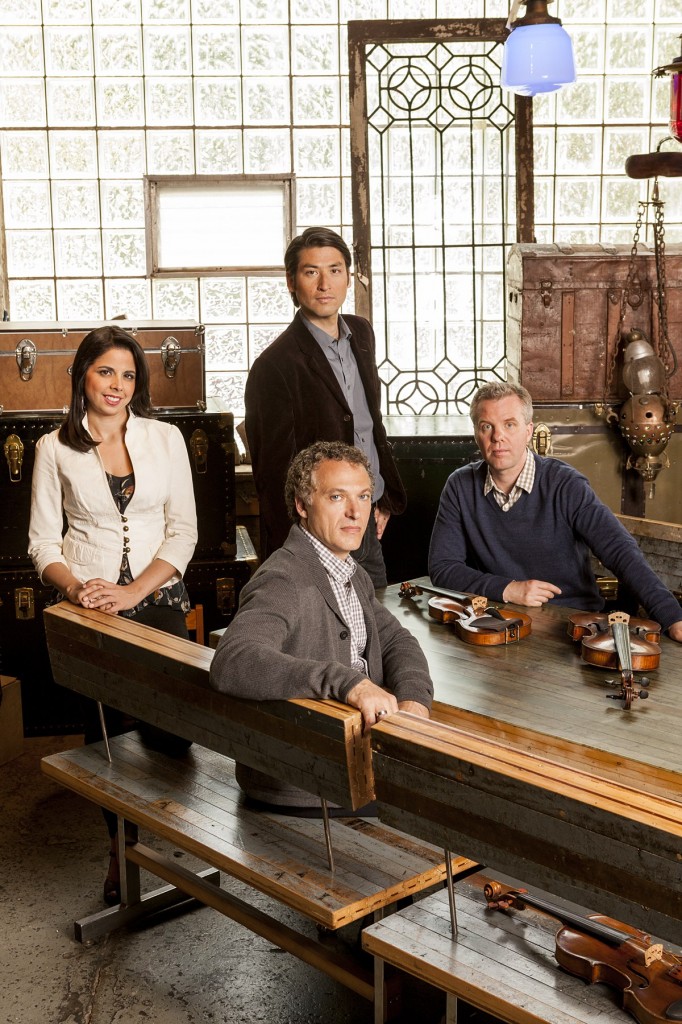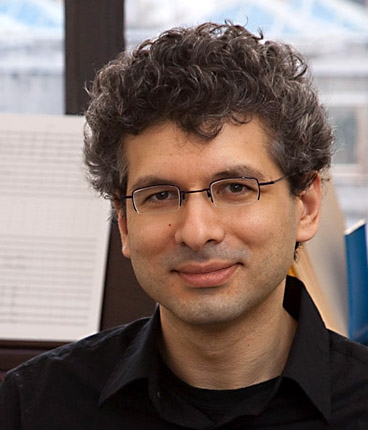Makan premiere stands out in Pacifica Quartet concert at Longy School

The Pacifica Quartet performed works of Mozart, Beethoven and Keeril Makan Wednesday night at the Longy School for the Celebrity Series. Photo: Saverio Truglia
In New York not long ago, a musician might perform all over town for ten or twenty years before getting up the nerve (and the hall rental fee) to make his or her “New York debut.”
Wednesday night at Pickman Hall of Bard College’s Longy School of Music, the Pacifica String Quartet, familiar to local audiences from four years as ensemble-in-residence at the Longy School, nevertheless made a Boston debut of sorts: its first top-billed performance with the Celebrity Series of Boston.
Anthony McGill, principal clarinetist of the Metropolitan Opera Orchestra, made his series debut as well joining the quartet in Mozart’s Quintet in A major for Clarinet and Strings, K. 581. Composer Keeril Makan did likewise, speaking from the stage to introduce the world premiere of his Return for String Quartet. Beethoven’s String Quartet in C-sharp minor, Op. 131, closed the program.
The debuts having been duly recognized and parsed, it was time to hear some music. Mozart’s quintet opened in sonic trouble; from a downstairs seat in the intimate hall, the strings sounded thin and acidic, nearly obliterated by the big, high-cholesterol sound of McGill’s clarinet. Also, a casual attitude toward rhythm was causing Mozart’s lovely themes to go out of focus, and one began to fear a return to the bad old days of treating this composer’s music as a throwaway before the main event.
Things began to look up in the Larghetto, which, if it has sounded more meltingly beautiful elsewhere, nevertheless benefited from McGill’s well-supported tone and phrasing, a better blend of singing clarinet with silky muted strings, and some touching interplay between McGill and first violinist Simin Ganatra.
But it took the robust rhythms of the Menuetto to finally brush the cobwebs out of this performance. The first trio, for strings alone and in the minor key, was refreshingly assertive, only to be amusingly undercut by the graceful and comical clarinet, dancing a Ländler in the second trio. That set the stage for the convivial pleasures of the finale, with the ensemble sounding relaxed and balanced in a set of attractively characterized and well-paced variations.
One might have expected the program to proceed directly to the new work, a one-movement piece lasting a quarter of an hour, with Beethoven’s massive quartet after the intermission, but the performers chose instead to take a break after the Mozart. Makan’s piece was thus paired with the Beethoven—appropriately, it turned out, since the two works share a mood of fierce concentration quite alien to Mozart’s amiable quintet.

Keeril Makan
Return is, in one sense, named for a musical term denoting the recurrence of a theme later in the piece, or (in tonal harmony) finding one’s way back to the home key. In this case, Makan told the audience before the performance, the title also relates to events in his life.
Listeners are usually cautioned not to hear music as autobiography—composers write happy pieces when they’re sad, and vice versa—but this time Makan embraced the idea. He composed Return last summer, he said, after returning to an arts festival near Perugia, Italy, that he’d attended six years previously.
“It’s about how to be in a place you’ve been before, at a different spot in your life,” Makan said. “Your expectations go this way, and what actually happens goes that way, so there’s a conflict.” He compared composing the piece to “keeping a journal,” and closed his remarks by promising the audience they’d hear “what I experienced this summer.”
Makan’s Perugian postcard—skillfully rendered by the Pacifica players in bold brushstrokes and primary colors—certainly did not translate as “Having a wonderful time.” Disjunct single notes and short gestures predominated, typically played in a harsh, bitten-off crescendo, and interspersed with tense pauses. The more relaxed interludes—a smooth chordal passage here, a bit of syncopated rhythm there, perhaps representing those summer-festival “expectations”—were few and brief.
The music did indeed return, almost obsessively at times, to a few germinal motives, and in the end it was that expert workmanship, and the integrity of Makan’s concept and the performance, that earned admiring applause for this prickly piece.
In his Op. 131, Beethoven contemplated music’s most traditional genres—fugue, aria, variations, sonata form—in a most radical frame, with seven movements coming one after the other without a break, cross-referenced harmonically and thematically in ways that have kept musical analysts up late ever since.
In a skillful and informed performance such as the one Wednesday night, the effect is kaleidoscopic, if not necessarily coherent. One can take endless delight in the way the pieces of glass tumble and form new colors and patterns, without asking what it all adds up to.
The work’s opening fugue, for example, wore its serious intent gracefully on this night, the quartet somehow weaving a unified, sensuous sonority out of parts played with warm individual expression. The variations movement, nicely characterized with a mostly bright color palette, offered a conversation that was a pleasure to eavesdrop on.
The Pacifica made the most of the scherzo’s manic mood; it is always amazing when four musicians can sound this wild and unpredictable together in exactly the same way. However, Beethoven’s repeats can make the unpredictable predictable unless the players change it each time, and this performance could have used more of that.
In the end, while each page of the sonata-form finale was handsomely rendered, the mystery of where Beethoven was going in this huge work remained unsolved, and his ramifications and recapitulations began to tire the ear. The applause afterward was a mixture of enthusiastic and polite.
The Celebrity Series of Boston will present violinist Midori and pianist Özgür Aydin performing music of Beethoven, Webern, and Crumb at Symphony Hall, 3 p.m. Sunday, Nov. 4. www.celebrityseries.org. (617) 482-2595.
Posted in Performances



